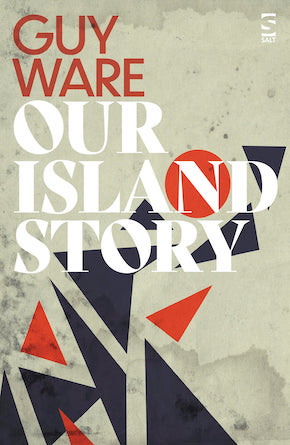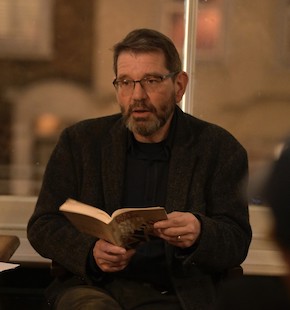Island stories and other fictions
by Guy Ware
When Rishi Sunak recently tried shamelessly to turn the Rochdale byelection into a national crisis, warning about extremism tearing us apart, one phrase leapt out at me. Immigrants who integrate, he said, “have helped write the latest chapter of our island story.”
Unless my publishers had really upped their game, I knew he wasn’t referring to the imminent publication of my latest novel. He – consciously or not – was referring instead to Henrietta Marshall’s 1905 publication, Our Island Story: A Child’s History of Britain. The same children’s book a newly-elected David Cameron had chosen in 2010 as his favourite ever.[1]
What is it about Our Island Story that so grips the Tory imagination? Ironically, the book is an almost parodically-perfect example of the “Whig interpretation of history”: that is, the idea that the story of humanity – in this case from a mythical past via the Romans to the end of Queen Victoria’s then record-breaking reign – is one of unbroken progress towards the inevitable freedom and perfection of the British Empire. The sort of history in which, as has been observed before, the British invented the Atlantic slave trade purely for the pleasure of subsequently abolishing it. After Cameron’s endorsement, there were efforts to reclaim Marshall from the forces of reaction, pointing to her condemnation of “bad kings” and approval of rebels like Boudicca and Wat Tyler. As the more recent beatification of Dr King and Nelson Mandela has shown, however, the political right is never slow to laud as plucky underdogs those they previously called terrorists – once, that is, they’re safely dead.
The unnamed Island in my novel is far from perfect, and getting worse. As the sea around it rises, large chunks – including the harbour and the houses behind – fall into the water. Farmers learn to fish. The displaced homeless sleep in shop doorways while developers build luxury flats. The politicians and bureaucrats who run the place know it’s happening, and why – just as we all know our climate is being destroyed by a rapacious capitalism that demands unsustainable growth. They – like us – also know what to do about it. At the same time, nobody really wants to know. Because the real answers are incredibly dull – all soul-sapping struggle against powerful vested interests, tedious international treaty negotiation and eating less meat. Like war, it’s either frightening or boring, and frequently both. As Ari Spencer – the SpAd’s SpAd – has advised the Island’s last three Leaders: “Nobody really wants to think about the endless boring stuff, much less do it. Or vote for it.”
Which is, of course, the point.
Ari knows that what we really want – or at least what we’ll settle for – is entertaining stories to tell ourselves. Islanders have two to choose from:
There’s ‘Our Island Story’ itself – the foundational myth of a blessed land where a prophet – Jacob – is rescued from the sea bearing a Child destined to grow up, become Leader and save them all. It’s a story everybody knows, taught in schools, acted out like Nativity plays. Like Marshall’s Island Story – like the Nativity itself, perhaps – it’s a story no self-respecting liberal Islander admits to believing, at least not literally, but which nonetheless shapes the way they think. Because that’s what stories do, offering the relief of resolution, of an ending.
And then there’s a conspiracy theory in which the entire Island, and everything on it – the buildings, the hills, the trees, the rocks: even, some claim, the Islanders themselves – was all “painstakingly constructed during the Great Simulation of the 1980s.” Which begs the questions of why it’s now falling apart – and who’s to blame. But in a conspiracy theory, that’s no flaw – it’s the point.
“A political problem, by definition, is one that can’t be solved.”
– Ari Spencer
Neither story gives any real answers, of course. What they offer is a familiar blend of distraction, consolation and ammunition for confected culture wars.
But the Island’s all-too-real collapse is speeding up, and something’s got to give.
Twenty years before the novel opens, Jacob King got himself fished out of the sea, along with his three-year-old daughter. With Ari’s help, he used the myth – the Island Story – as his route to power. Three days before the novel opens, he passes the baton to his daughter, Jessica. She’s elected – again with Ari’s help – promising to stop the Island sinking; to eradicate homelessness; and to expose the truth about the death of half a dozen climate protesters a decade earlier.
Which is all fine, for a manifesto. Nobody on the inside – especially Ari, who wrote it – expects anything to happen. But Jessica has grown up as the Child, as the Saviour promised by Our Island Story. She is a true believer. Ari knows there’s nothing more dangerous: but Jessica is Leader now, and his choices are limited. He hatches a plot to give her what she wants, or at least what she ought to want, if only she’d start thinking like a politician. He winds up the opposition, pitching traditional myth against the forces of conspiracy in a potentially apocalyptic showdown that drags in every aspect of the Island’s establishment. With, as they say, hilarious consequences.
At a time when trust in politicians and the stories they tell has never been lower – a trend greatly exacerbated by the cynical boosterism, jingoism and casual relationship with the truth that has characterised all our leaders from Cameron to Sunak – it may be tempting to think we need more Jessicas, and fewer Aris. More genuine idealism, less manipulation. But, if there is a lesson to Our Island Story – Marshall’s or mine – it may be that the desire for answers, for endings, can itself be dangerous. Beware politicians offering solutions.
In late 1937, Henrietta Marshall published a less famous follow-up, Kings and Things, taking her children’s history to the brink of global catastrophe (without once mentioning the Nazis). The closing paragraph reminds us that “being a Good King of England isn’t all like living in a Fairy-Tale, as you who have read this book Very Well Know.”
Indeed.
Life on the Island isn’t a fairy tale: it isn’t any kind of story, in fact, precisely because it doesn’t end. We have to keep doing stuff – endless, often boring stuff – over and over again to make it better; or at least to stop it getting worse.
—

Guy Ware is the author of five novels and a collection of short stories. Our Island Story is available now from Salt Publishing.
Read more
@guyware
@saltpublishing
linktr.ee/guyware
[1] For what it’s worth, Cameron’s deputy Nick Clegg chose The Gruffalo, and only subsequently discovered that monsters are real after all.

